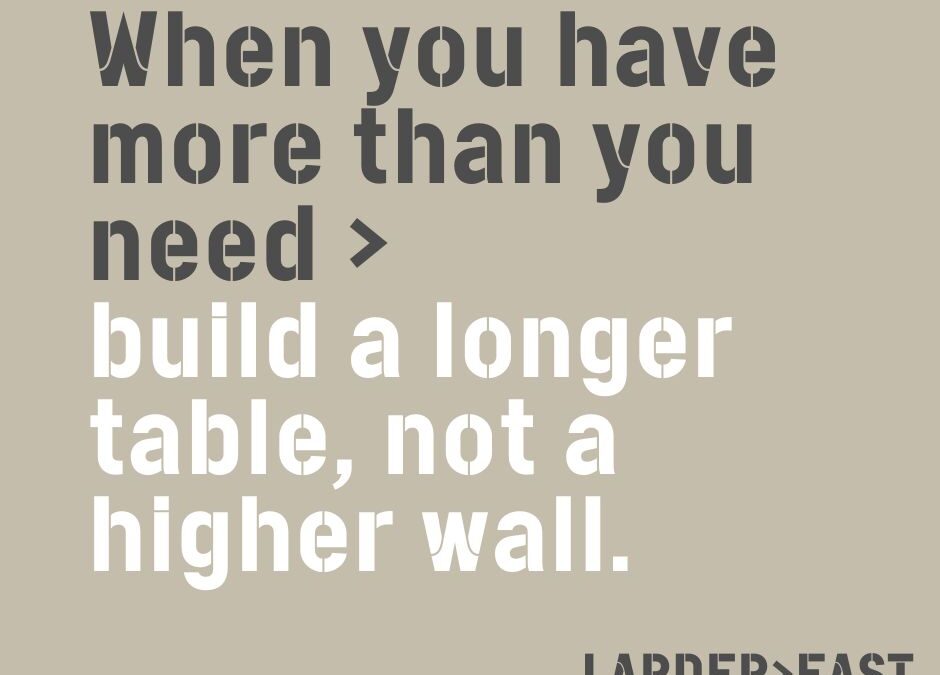Tidal surges of abundance and scarcity wash over churches with each festive season and recently, harvest celebrations provided a fleeting moment to notice the world of scarcity – a world of people without sufficient income to provide for their families. In the face of unprecedented need for emergency food provision, many Christian churches consistently play their part donating food but fail to express anger over the normalising of a culture of scarcity that commits almost 1 in 5 people in NI to poverty. It almost feels too political to speak out so how, with integrity, can Christians ‘sing the Lord’s song’ in this strange land?
As a Christian, I am inspired by the writings of the ‘Old Testament’ scholar, Walter Brueggemann. He helps to make sense of the patterns of thought that create mindsets of abundance and scarcity; the mindsets that polarise and create enmity between the ‘haves’ and the ‘have nots’ in society. Brueggemann makes a paradoxical observation; the rich, imbued with an excess rely on an ideology of scarcity, while the poor, living with insufficiency rely on an ideology of abundance.
Believing in scarcity, the rich say there’s not enough, so they hoard and put aside more than needed, so that it will be there for a rainy day. Even if others must do without. Believing in abundance the poor in contrast, believe there is enough to go around if people only take what’s needed. Choosing to have and not hoard may even produce abundance.
God sets in motion a world of abundance, the world that is well ordered, “It is good, it is good, it is very good”; the world will have enough. However, it is not long before the surge of scarcity sweeps over the desert when there is no bread. Then, with generosity the tide turns, and God’s abundant and daily manna transforms a barren wilderness.
Similarly, Jesus exudes generous abundance. He seeks out people broken by a scarcity of good health, of acceptance, of power, of understanding. Perhaps the most relatable stories are of his emergency food provision; Jesus fed 5000 and 4000 respectively and in each incident the story is a simple one…people have run out of food, this is a full on bodily sense of an emergency. Jesus is moved ‘to compassion’ but the disciples obviously miss the echo of Exodus for they are stuck on scarcity, they are resistant, pragmatic, and efficient. So, when they say, ‘how can you?’ they are really saying ‘you can’t…’ Then Jesus asks, ‘How many loaves do you have?’ They answer…“Seven”. Seven – the number of days God spent creating the world.It is enough!
In that New Testament desert, Jesus’ actions are transformative, and Mark specifically uses four words to describe Jesus’ antidote to scarcity: he took, thanked, broke, and gave. They are Eucharist words, and the seven loaves in Jesus’ hands practised the generosity of the creator God. It is as though Genesis 1 reappears in Mark 8, and the world is again made new.
The world remains an anxious place, fuelled by a market ideology that is about taking more, not thinking about our neighbour, being fearful, short-sighted, grudging. Against this, I wonder if we Christians have been conditioned to act like the disciples – are we worried that there would not be enough to go around? That is a different kind of desert, but a desert nonetheless… so, what if we lived more within the limitless generosity of God. Could the culture of scarcity, of rationing, of monopolising, of storing up, behaviours that trap people in scarcity or poverty be transformed by taking, thanking, breaking and giving?
Advent is a glimpse an alternative world, one that is not dominated by scarceness. It is preparation for a “newness” that requires the relinquishment of what is old and gone, even when the old has a deep and insistent grip upon us. In this final week of Advent 2024 may we remember Jesus’ neighbourly generosity and defiantly practice an economy self-giving abundance.
Lynda Gould is the Project Co-ordinator for Faith Engagement in NICVA, and a former staff member in ECONI. She recently completed research on Faith and Foodbanks.
Featured image is taken from The Larder Food Hub (East Belfast) Facebook page.
Please note that the statements and views expressed in this article of those of the author and do not necessarily represent those of Contemporary Christianity.


Thank you Lynda. Love that last sentence. And the reminder of Advent looking forward to a new world, calling us to live in light of it in the present. I think it was William Cavanaugh who said that consumerism is the death of eschatology.
Great food for thought during this advent season, and as we look to 2025 as an opportunity to establish new patterns of living and giving.
Thank you Lynda for penetrating comments on our scarcity mind set when we worship an abundant God.
But to be picky, Genesis 1 says creation took six days and on the seventh God rested … 🙂